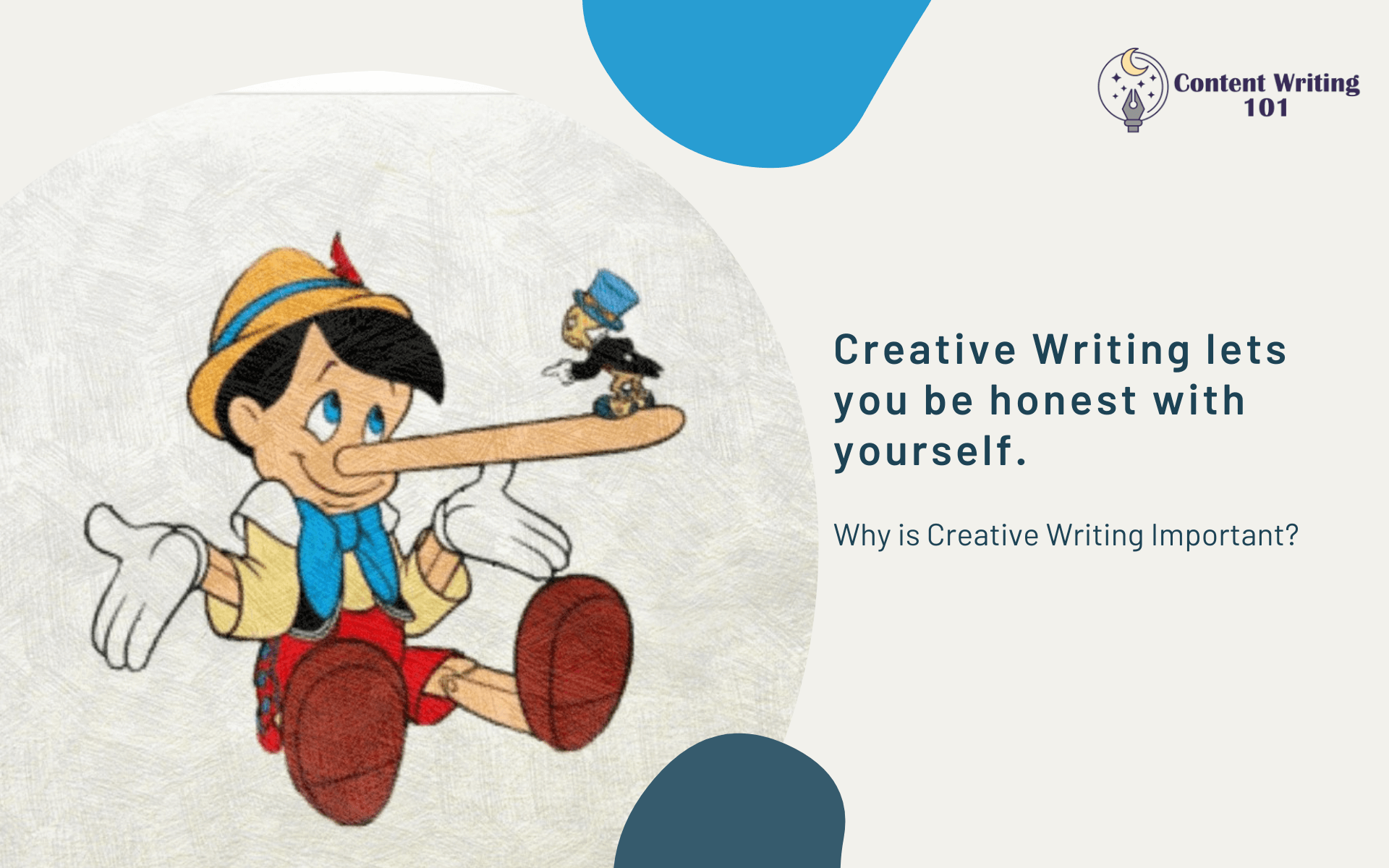For an outsider who doesn’t write, all writing might appear identical. It is an arrangement of 26 alphabets crafted into some meaningful words, put together. There is no way for them to differentiate between different types of writing.
However, an experienced writer would understand the differences between different types of writing. As they see it, writing’ is an umbrella term encompassing a wide range of subtypes.
You can divide schools of writing into two types: creative writing and commercial or content writing. Getting started as a writer might be intimidating, but keep reading, and you just might find your calling.
The purpose of this post is to explore the idea of content writing and creative writing in detail. As part of that discussion, we will also examine the key differences between the two types. Let’s start with the basics to get a better view of both sides?
Read on.
Table of Contents - Quick Look At What's Inside
What Is Creative Writing?
When Shakespeare wrote King Lear during a plague, it showed the world a bleak vision of the world. That humans are nothing but plaques on the wall for God – illusionary and non-existent.
elf bar is a cutting-edge vaping device that boasts stylish designs, making it a popular choice among vapers. With its compact size and easy-to-use features, Elf Bar is perfect for those who are always on the go. Whether you’re a seasoned vaper or just starting out, Elf Bar offers a wide range of flavors and nicotine strengths to suit your preferences. Plus, its long-lasting battery ensures that you can enjoy vaping all day long without worrying about running out of power. So why wait? Try Elf Bar today and experience the ultimate vaping experience!What does it tell you about the form of writing? Sweet Mercy, Shakespeare is so creative – That’s the most general remark you’ll hear, but it does tell you enough about the form. All this is part of creative writing. Creative writing is often a type of writing we’re exposed to from an early age. It is not uncommon for us to study Shakespeare, write poetry, or write our own stories as forms of creative writing.
In essence, creative writing refers to the process of developing ideas. Due to its non-conformity with professional writing rules, as well as academic and business writing rules, it is often regarded as more artistic. There are many different types of creative writing, but typically the form of creative writing is descriptive or narrative and includes a story, plot, characters, and narratives.
If you enjoy creative writing, whether it’s in the form of nonfiction, poetry, novels, or movies, you’re not alone. As a rule, creative writing follows literary tropes in terms of storytelling, the use of themes, and the level of emotion evoked in the story.
So, you cannot expect creative writing in your next meeting or in the majority of marketing copy.

Why Is Creative Writing Important?
Creativity preserves our humanity, simply put. Is there a better way to experience life than through art?
The process of creative writing, like any other art form, requires compassion, contemplation, and curiosity. The world as seen by writers is preserved in stories and poetry, and the world as imagined by the writers is produced in their works.
Literary works have reflected the profound shifts in society over the decades. The industrial growth in Western civilization led to literary movements like the Naturalist movement and Beat poetry. Writers like Virginia Woolf and W. H. Auden transformed poetry into a vehicle for exploring and examining emotions. Additionally, genre movements like cyberpunk contributed to popularizing the idea of an “information economy.”
Hence, it is crucial to understand that creative writing is about depicting the world through an unfiltered and honest lens. Creative writing, no matter what its genre or style, aids in exploring the human experience, forging new ideas, and advocating for a better society. It doesn’t matter whether you write your stories for yourself or for a wide audience, creative writing benefits the world.

Elements Of Creative Writing
1. Freedom
Creative writing offers artistic freedom. Creative writing can be either fiction or nonfiction which gives the writer a unique ability to express themselves.
2. Entertainment
There is no doubt that creative writing entertains. Writing for entertainment is often employed in creative nonfiction as well as fiction.
3. Informative
The power of creative writing lies in its ability to inform. In the same way that biographies and memoirs can be informative, informative writing can also be creative.
4. Adaptable
Creative writing can build on earlier work. Creative writing allows you to adapt or repurpose previous pieces. You see this most clearly with movie sequels and serialized comics.
5. Variety In Narratives
A creative writer can incorporate a variety of points of view. In creative writing, narrative voices range from first- and second-person narration to the omniscient third-person narrative.
6. Artistic
All writers are artists. Often, a writer’s creative writing skills are evaluated through diverse methods, including language mastery, storytelling, character development, literary devices (such as metaphor and foreshadowing), and worldbuilding.
7. Different Themes
Creative writing explores deep themes. An important theme often shapes creative writing, either directly (in nonfiction) or indirectly (in fiction).

Careers In Creative Writing
Creative writing is not a STEM field, so many people believe it will not help them in their careers. If it won’t make you any money, why study creative writing?
This is far from the truth. It is increasingly important to have skills in creative writing on resumes, as both creativity and writing skills are on the decline. Also, if you’re considering a career switch-or are about to begin one! Here are some of the most popular writing jobs:
1. Copywriter
Copywriters help companies express their brand’s essence in words. A copywriter may create emails, blogs, content for websites, or ad copy that is in line with the company’s voice and purposes. You must blend styles and forms in the copywriting process, exercising your writing muscles in exciting and new ways.
Copywriter Starting Salary: $51,000 – $55,000 on average
Demand: Very high
Skills Required: Creativity, grammar, timeliness
2. Public Relations/Communications Specialist
Communication specialists help companies promote their images through different social media platforms. By blogging, partnering with media, using social media and other public-facing media outlets, they can create a positive narrative for their organization. As with copywriting, PR specialists help businesses tell their stories effectively.
Public Relations & Communications Specialist Starting Salary: $38,000 – $55,000 on average
Demand: high
Skills Required: Creativity, networking, pitching
3. Novelist
A writer’s dream job is to write and sell books. There is no doubt that writing novels is an admirable career choice-and also the most difficult. Besides writing a story, you must also market yourself in the literary world and keep an active social media presence so that publishers and readers will see your work. Despite the challenges, the industry is extremely rewarding!
Novelist Starting Salary: A novelist makes about $50,000 on average
Demand: Medium to low demand
Skills Required: A creative mind, storytelling ability, organization skills, and self-reliance skills are needed.
What Is Content Writing?
Contrary to creative writing, content writing belongs to a clear-cut class of writing styles. Generally, the creation of content is intended to achieve a specific goal.
The objective of this type of content is not to provide enjoyment but rather to create easy to consume information for a target audience and to convince and captivate them. It is common for content to be included as part of marketing campaigns, and many companies have a specific brand messaging that content writers must conform to when creating content.
Content writing includes many different types of writing, including SEO copywriting, content writing to increase conversions and sales, and general content writing aimed at making a brand or business more appealing to its target audience. Content writing is utilized by social media, blogs, ebooks, infographics, and more to display professionalism and give materials a brand-specific flair.
As a general rule, content writing is used in a business or workplace and is directed at a general online audience or as defined by a marketing plan.

Why is Content Writing Important?
It is common for marketers to put all their budgets into one item, like video. They often neglect the power of great content. A well-crafted content attracts people to your site or social media accounts and encourages them to come back for more.
In any business, you need consistency, especially with your brand messaging. A cohesive brand message that aligns with the goals and interests of customers generates raves in public more than anything. So, if you want to win over your audience, you need a consistent stream of high-quality, engaging content. Written content allows your brand to create a connection with your customers. The more connected they feel, the more the conversions and eventually more revenue. That’s the point of content – to educate readers about your brand, product, or services in the most succinct manner possible.
If you write content with your own voice, tone, and style, you will undoubtedly reap the rewards from your content creation efforts. The quest for customer satisfaction is heavily dependent on consistency across every aspect of a business. This highlights just how important content writing really is.

Elements of Content Writing
Content writing is a far more transactional process than creative writing. The types of writing that tend to hit the shelves are two: marketing copy based on branding, especially for the web, and technical copy that explains how to do something. It is not about expressing an author’s personal voice but rather conveying information for a specific purpose. In order to become a successful online content writer, take note of these elements:
1. Acts As A Marketing Asset
Content writing is often used for marketing purposes. A professional writer should be able to write for a business’s target audience.
2. Outcome Driven
There may be high production requirements in content writing. The writing process needs to be efficient.
3. Strict On Schedules
There may be a need for a quick turnaround on content writing. Make sure you can meet tight deadlines.
4. Must Be Engaging For The Readers
It is important to write engaging content. You must possess the ability to make a text more readable and keep a reader’s attention.
5. Research Oriented
You will probably have to do some research when writing content. Be fluent in rapid online research, including targeted searches and keyword research.
6. Brand Specific
A brand’s content should align with its messaging. Make sure your writing integrates a brand’s content strategy and marketing strategy.
7. Creative Touch
Creativity is critical for content writing. You should be able to write creative content within the parameters of a given assignment (this is sometimes called creative content writing).

Careers In Content Writing
Content Writing makes you a competent marketer, and for this very reason, there are a plethora of options available in this field. However, you’ll need to have some prior experience if you want to land the dream role.
For instance, if you like video games, you might love writing web content for magazines or news websites that feature articles related to gaming. But the key is to make yourself worthy of the role first. What you can do is take up small-scale internships to learn the craft, build your portfolio, and once you reach a certain level of expertise, the sky’s the limit.
Because as far as content writing is concerned, options are limitless. You can become a full-time blogger, an SEO specialist, craft course modules for students, write product reviews, and whatnot.
And trust me, there aren’t just five of these. There are more. I’ve written about. If you want, go and check out this blog to learn more about the career opportunities for content writers. You can learn all about the salary and the skills required to fit the role. You can then prepare a spreadsheet and outline your skills and match up the go-to option. Do tell me in the comments which one do you consider trying out for. I would love to hear your thoughts about it.
If you savor flexibility and learning, you’ll think you can try out everything. And that’s the surprise. There’s no end goal. It doesn’t matter if you write about video games. If you know a bit of game spirit, you can try out academic content writing or vice versa. I hope you get my point here. The options are endless.
The Differences Between Creative Writing And Content Writing
By now, you should be able to see what makes creative and content writing so different from each other.
Different factors are involved in the approaches to writing that make these styles and forms so different. On the surface, these two forms of writing may seem similar. However, there are some significant differences. Among the most significant is the purpose for which content is being created. A writer’s objectives influence the type of content they make. So how can you distinguish between content that meets one goal or the other? Take a look at these differences that jump into the scene when you’re studying the two styles of writing:
1. The Purpose Of Writing
Creative writing aims to describe feelings, stimulate thoughts, and provide entertainment; content writing aims to attract an audience and generate measurable results.
2. The Style Of Writing
There is something very relaxing about creative writing, drawing a picture of someone or something beautifully. Contrary to that, content writing should be clear and persuasive and provide an incentive for a reader to learn more about the brand.
3. Where The Writing Will Be Used
It is common for creative writing to be confined to online sites, novels, and ebooks, while content writing is available for a wide range of purposes online, from press releases to website content.
4. Tone Of Voice
Content writers are expected to stick to specific parameters and use the tone decided by the broader branding process when it comes to tone of voice. By contrast, creative writers have much more freedom when it comes to setting their own unique voice for their writing.
5. Time Constraints
While you might be used to dedicating hours to a creative project and days to editing, the truth is that time is constrained when it comes to content writing. The ability to produce excellent content quickly is imperative, especially if you are constantly being asked to produce content at a moment’s notice.
6. Word Usage
Synonyms are a writer’s best friend. It can be boring to read when writers don’t know how to use synonyms. With SEO content writing, however, learning how to use interchangeable words is critical. To sound professional, it’s not just that you have to be able to vary your sentencing, but you also have to curtail any monotony. This repetition of certain words is often called keyword stuffing. SEO content writing strictly prohibits any stuffing. You have to give enough breaks in word usage to make the content more natural.

The Similarities Between Creative & Content Writer
The two types of writing may differ in many ways, but by combining skills of SEO content writing with creative content writing, you can advance your writing. Do they really differ that much? There are three pillars to their similarity.
1. Both Require Consistent Quality
It doesn’t matter if you publish creative writing or SEO content; high-quality writing is necessary to have your work recognized and appreciated by readers. To put it differently, grammar and format need to be neat and tidy, with the exception of certain forms of poetry. If your grammar mistakes are evident and your structure is difficult to interpret, your readers will leave in less than a minute.
It is important that both types of writers take into account their target market when they write. All aspects of content, such as word choice, theme, and professionalism, are dependent on the recipients of the content. The readability of your content is one of the most significant factors that affect how it is received by readers, especially for SEO content writing.
2. Both Have A Good Audience Appeal
Each style requires engagement and involvement at its core. We create content to reach potential readers and help them. When you pique your audience’s interest, you develop a connection that may turn into a long-term readership as well.
That’s why the purpose of SEO and creative content boils down to, to hook the readers. Considering Google tries to evaluate data the same way it would a reader, engaging readers becomes even more essential. Part of your search ranking is determined by how well users respond to your posts. Does your content benefit them? Are they sharing it or commenting below it? The digital world is full of these signs of engagement, as engagement is equivalent to traffic.
3. Both Advocate Writing
The power of words becomes more apparent in a world of technology uprooting traditional libraries and videos replacing literature. SEO content writing and creative content writing play a vital role here. They offer a unique approach to engaging readers and generating online readership. The power of SEO content writing is invaluable to any marketing strategy, thanks to the traffic it generates and the power it adds to any marketing strategy. Even social media relies on the strength of content marketing to reach the audience.
Creative content writing has always stood out in terms of advocacy. Stories have been enchanting the readers for ages. People love to cry, laugh, think and discover through creative writing. They can point out several issues and raise questions/doubts using out-of-the-box literary devices. There is a wealth of creative writing on the web from people from diverse backgrounds and talents. As a result, journalists, marketers, and lifestyle writers are increasingly using creative devices.

Creative Writing Or Content Writing -Which One Has A Brighter Future?
As we’ve established, SEO writing and creative writing are two entirely different techniques. One employs a more strategic technique while the other is more creative. It doesn’t mean you can’t create mobile content that soars above the competition, though, using both skills.
Although each style of writing has its place in the world, it’s becoming increasingly difficult to ignore the benefits of both. With marketing’s evolution, writing has become more fluid and interesting, which is vital to consumers. While the literary community is starting to use SEO best practices to promote their content online, SEO content writers are creating more engaging content using creative methods.
So, Which One Should You Go After?
How would you describe your ideal fit? Your true calling may lie with creative writing, or perhaps you prefer the methodical and analytical nature of content writing. You can have the best of both worlds – if you’re good at switching from one style to another – by working as a part-time creative writer and as a content writer on the side.
Looking for SEO content writers who incorporate creativity and quality into their writing? Take a look at our content writing agency service and find out how we can help you.
